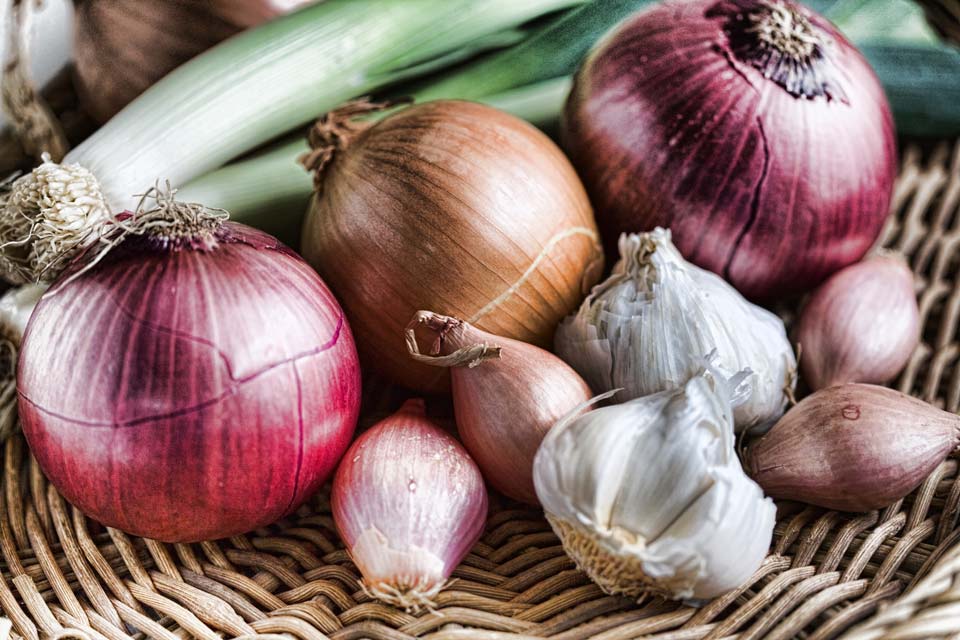Garlic and Onion Toxicity in Dogs

Did you know that dogs shouldn't have food in the onion family, including garlic, chives, and leeks? It's true—large amounts of garlic or onions can result in toxicity for dogs. And the amount may not actually seem that large. A 30-pound dog can be poisoned by about 2.5 ounces of onion.
Dogs can be poisoned by onions, garlic, and related items if they eat a lot of it at one sitting or little bits over time.
What About the Onion Family Causes Toxicity?
Plants in the Allium family can irritate the throat and gastrointestinal tract, resulting in drooling, nausea, vomiting, and diarrhea.
But the more concerning thing that items in the Allium family can do to dogs is cause destruction of red blood cells (hemolysis). When that happens to enough RBCs, it's anemia, and that impairs the ability for oxygen to be delivered to all the tissues.
Japanese breed dogs, including Akitas and Shiba inus, are even more susceptible to Allium toxicity than other dogs. Cats are also more sensitive.
Additionally, Alliums can cause low blood pressure and even further decreased oxygen delivery. Eventually, the dog can experience organ failure because of a lack of oxygen to the cells.
Signs of Allium Toxicity in Dogs
The signs of toxicity of garlic, onions, leeks, and chives in dogs include:
- Drooling
- Foul breath
- Vomiting
- Diarrhea
- Pale mucous membranes
- Weakness
- Reddish urine
- Increased heart and respiratory rates
- Panting
- Collapse
Diagnosis of Onion Family Toxicity in Dogs
Diagnosis of this condition is made through a combination of your history (did you see your dog eat the items?), a physical exam where the doctor may notice signs of anemia (pale gums, rapid respiratory rate), and CBC results that show a particular type of anemia (Heinz body).
Treatment of Allium Toxicity in Dogs
If the dog ate a large amount of onion, garlic, leek, or scallion very recently, the doctor might induce vomiting to get as much out of the stomach as possible. He or she may then administer activated charcoal to help absorb more of the substances and carry it through the body unabsorbed.
Otherwise, supportive care procedures of hospitalization, IV fluids, and medications for GI upset can help treat the dog.
In severe cases, a blood transfusion may be necessary. Oxygen therapy could also be required.
Preventing Onion Family Toxicity in Dogs
All forms of the onion family are toxic to dogs, including raw, powdered, dehydrated, and cooked. So, it's important to check labels before you give your dog any human food.
Fence off the garden area if you grow these plants to keep your dog from helping himself.
Make sure your trash can is secured, so your dog can't get to leftovers containing items in the onion family.
Keep spices and human foods and supplements out of reach of your dog.
Never add garlic, onion, or anything in that family to homemade food or treats you make for your dog.
You May Also Like These Articles:
Garlic and Onion Toxicity in Cats
7 Surprising Products Containing Xylitol: A Slideshow
Slug and Snail Bait Poisoning in Dogs
A Hidden Laundry Room Danger for Dogs: Laundry Pods
Disclaimer: This website is not intended to replace professional consultation, diagnosis, or treatment by a licensed veterinarian. If you require any veterinary related advice, contact your veterinarian promptly. Information at DogHealth.com is exclusively of a general reference nature. Do not disregard veterinary advice or delay treatment as a result of accessing information at this site. Just Answer is an external service not affiliated with DogHealth.com.


